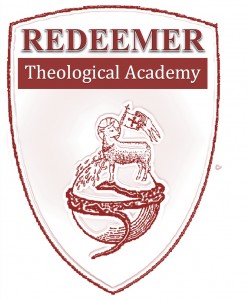Christmas Eve
Monday, Dec. 24
Children’s Christmas Play 6:00 pm
Candlelight
Service 7:00 pm
Christmas Day
Tuesday, Dec. 25
Divine Service 10:00 am
"For I know that my Redeemer lives, and at the last he will stand upon the earth. And after my skin has been thus destroyed, yet in my flesh I shall see God, whom I shall see for myself, and my eyes shall behold, and not another." (Job 19:25-27, ESV)
 Lecture 22- Timothy, Titus, the Successors to the Apostles, and the Written Word Part 4 (click here)
Lecture 22- Timothy, Titus, the Successors to the Apostles, and the Written Word Part 4 (click here) Lecture 21- Timothy, Titus, the Successors to the Apostles, and the Written Word Part 3 (Click Here)
Lecture 21- Timothy, Titus, the Successors to the Apostles, and the Written Word Part 3 (Click Here) Lecture 19- Timothy, Titus, Successors to the Apostles, and the Written Word Part 1 (Click Here)
Lecture 19- Timothy, Titus, Successors to the Apostles, and the Written Word Part 1 (Click Here)
| |||||||||||

| CTS Professor Offers Response to Gospel of Jesus’ Wife | ||
For Immediate Release
September 26, 2012 FORT WAYNE, IN (CTS)—In the last several days much has been circulated concerning a small, papyrus fragment of Coptic text which has been dubbed the Gospel of Jesus’ Wife by Professor Karen King of Harvard Divinity School. These types of “finds” always create quite a stir and that is why Dr. Charles Gieschen, Academic Dean and Professor of Exegetical Theology at Concordia Theological Seminary, Fort Wayne, Indiana, has studied this material and offered a brief analysis of its significance. His response may be read and downloaded at www.ctsfw.edu/response-to-the-gospel-of-jesus-wife. Dr. Gieschen, who earned his Ph.D. from the Department of Near Eastern Studies at the University of Michigan (1995) where his studies included the Coptic language and Gnostic writings, is an excellent resource for this topic. He has examined the digital image of this fragment, King's article and some early feedback of other scholars. His brief response walks the reader through the history of the fragment, discusses the various interpretations and comments on the import of the fragment. Dr. Gieschen concludes, “This fragment, therefore, may assist us in understanding the teaching of a Gnostic group concerning Jesus and His marital status, but it does not help us to understand the teaching of the historical Jesus or His actual marital status.” The best place to look for early and historically reliable evidence of Jesus' life, as Dr. Gieschen notes, is the four canonical Gospels. This fragment does nothing to displace the testimony of these Gospels that Jesus supported marriage as a divine institution, but was not himself married.
###
Concordia Theological Seminary exists to form servants in Jesus Christ who teach the faithful, reach the lost, and care for all.
For additional information concerning educational opportunities and events at CTS, please contact: Jayne Sheafer, CTS Director of Public Relations, 260-452-2250 or PublicRelations@ctsfw.edu. If you no longer wish to receive these updates you may opt-out. | ||
 The Person and Work of the Holy Spirit in the Epistle to the Ephesians
The Person and Work of the Holy Spirit in the Epistle to the Ephesians Christ is the Son of God who was sent into the world in order to give to us life. By His death on the cross, we have life in Him. After the ascension of Christ, He sent the Holy Spirit to bring life to the world through His church on earth. Without the work of the Holy Spirit, we cannot come to God or hear the word of God. The Holy Spirit continues in our day to call, gather, and enlighten us in the knowledge of salvation found alone in Christ.
Christ is the Son of God who was sent into the world in order to give to us life. By His death on the cross, we have life in Him. After the ascension of Christ, He sent the Holy Spirit to bring life to the world through His church on earth. Without the work of the Holy Spirit, we cannot come to God or hear the word of God. The Holy Spirit continues in our day to call, gather, and enlighten us in the knowledge of salvation found alone in Christ.


 “Walk in wisdom toward outsiders, making the best use of the time. Let you speech always be gracious, seasoned with salt, so that you may know how you ought to answer each person.” (Colossians 4:5-6, ESV)
“Walk in wisdom toward outsiders, making the best use of the time. Let you speech always be gracious, seasoned with salt, so that you may know how you ought to answer each person.” (Colossians 4:5-6, ESV) Example of a weak confession found on the internet :
Example of a weak confession found on the internet : It is not helpful to talk about the person and work of the Holy Spirit as the presence and power of God. To begin with, this ambiguity leads to the idea that the Holy Spirit is not God; rather, He is merely the power or presence of God like a spiritual force acting out the will of God. We cannot separate the three persons of the Blessed Trinity from each other.
It is not helpful to talk about the person and work of the Holy Spirit as the presence and power of God. To begin with, this ambiguity leads to the idea that the Holy Spirit is not God; rather, He is merely the power or presence of God like a spiritual force acting out the will of God. We cannot separate the three persons of the Blessed Trinity from each other. We should walk in wisdom and make the best use of our time. Rather than confessing that the Holy Spirit is the presence and power of God, we should clarify that the Holy Spirit is God who is worshiped and glorified together with the Father and the Son. Our Triune God is omnipresent. Thus, wherever the Holy Spirit is present, the Father and the Son are present too.
We should walk in wisdom and make the best use of our time. Rather than confessing that the Holy Spirit is the presence and power of God, we should clarify that the Holy Spirit is God who is worshiped and glorified together with the Father and the Son. Our Triune God is omnipresent. Thus, wherever the Holy Spirit is present, the Father and the Son are present too. The rejection of the Rock of our salvation is a constant theme throughout the holy scriptures. As soon as the people of God were delivered from slavery in Egypt their praising of God’s work of salvation was quickly turned into grumbling and complaining. The refused to continue to listen to His voice in the mouths of His prophets. No wonder, that the leaders of Jerusalem rejected the Christ in the days of the apostles and people continue to refused to listen and be saved.
The rejection of the Rock of our salvation is a constant theme throughout the holy scriptures. As soon as the people of God were delivered from slavery in Egypt their praising of God’s work of salvation was quickly turned into grumbling and complaining. The refused to continue to listen to His voice in the mouths of His prophets. No wonder, that the leaders of Jerusalem rejected the Christ in the days of the apostles and people continue to refused to listen and be saved.
| |
|
 “Walk in wisdom toward outsiders, making the best use of the time. Let you speech always be gracious, seasoned with salt, so that you may know how you ought to answer each person.” (Colossians 4:5-6, ESV)
“Walk in wisdom toward outsiders, making the best use of the time. Let you speech always be gracious, seasoned with salt, so that you may know how you ought to answer each person.” (Colossians 4:5-6, ESV)
 The above list of beliefs was found on a page that was titled “What We Believe.” Yet, there was nothing on the page that confesses the God in whom they believe; instead, they list five different things that they believe about worship. Each one of these components is ambiguous. Any church could squeeze herself into this mold. In fact, even non-Christian groups like the Jehovah’s Witnesses and Mormons could embrace this five point belief system of worship.
The above list of beliefs was found on a page that was titled “What We Believe.” Yet, there was nothing on the page that confesses the God in whom they believe; instead, they list five different things that they believe about worship. Each one of these components is ambiguous. Any church could squeeze herself into this mold. In fact, even non-Christian groups like the Jehovah’s Witnesses and Mormons could embrace this five point belief system of worship. We should walk in wisdom and make the best use of our time. Rather than confessing what we believe about worship, we should confess what we believe about the God whom we worship. Only when we correctly understand who Christ is and what He has done of us to atone for our sins, can we rightly worship God. True worship is believing in the promises of God found in Christ. Thus, it would be better to post the Nicene Creed on the internet under the title “What We Believe.”
We should walk in wisdom and make the best use of our time. Rather than confessing what we believe about worship, we should confess what we believe about the God whom we worship. Only when we correctly understand who Christ is and what He has done of us to atone for our sins, can we rightly worship God. True worship is believing in the promises of God found in Christ. Thus, it would be better to post the Nicene Creed on the internet under the title “What We Believe.”